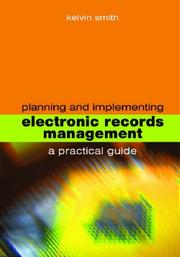| Listing 1 - 3 of 3 |
Sort by
|

ISBN: 9781856046152 185604615X 9786613024633 1283024632 1856047970 Year: 2007 Publisher: London : Facet Pub.,
Abstract | Keywords | Export | Availability | Bookmark
 Loading...
Loading...Choose an application
- Reference Manager
- EndNote
- RefWorks (Direct export to RefWorks)
Many organizations are moving away from managing records and information in paper form to setting up electronic records management (ERM) systems. There is a range of reasons for this: economic considerations may be the driver for change, or government policy initiatives may be coming into play. Whatever the whyfor in your organization, this book provides straightforward, practical guidance on how to prepare for and enable ERM. It sets out and explains the issues organizations need to consider in selecting a system, and the procedures required for effective implementation. Help is also given with the complexities of managing hybrid records during an interim period between paper and electronic record management. The book is divided into three main parts covering the preparation for ERM, and its design and implementation. The key areas covered are: the underlying principles; the context; making a business case for ERM; the main issues for design; the information survey; the file plan; appraisal methodology; preservation; access; the main issues for implementation; project management; procurement; change management; training; the future of information management. This essential guide should be on the desk of any library and information professional, records manager, archivist or knowledge manager involved in planning and introducing an ERM system, whether in a public or private sector organization.
Electronic records --- Archives électroniques --- Management. --- Gestion --- Electronic records - Management --- Electronic filing systems --- Business records - Data processing - Management --- Records - Data processing - Management --- Electronic filing systems. --- Business records --- Records --- Data processing --- Business --- Commercial records --- Corporations --- Office records --- Office management --- Paperwork (Office practice) --- Filing systems --- Office practice --- Computer-based records --- Digital records --- Digitized records --- Documents in machine-readable form --- Machine-readable records --- Automation
Book
ISBN: 1800731868 180073185X 1800731957 9781800731851 1805391437 Year: 2021 Publisher: New York : Berghahn,
Abstract | Keywords | Export | Availability | Bookmark
 Loading...
Loading...Choose an application
- Reference Manager
- EndNote
- RefWorks (Direct export to RefWorks)
"Museums and archives all over the world digitize their collections and provide online access to heritage material. But what factors determine the content, structure and use of these online inventories? This book turns to India and Europe to answer this question. It explains how museums and archives envision, decide and conduct digitization and online dissemination. It also sheds light on born-digital, community-based archives, which have established themselves as new actors in the field. Based on anthropological fieldwork, the chapters in the book trace digital archives from technical advancements and postcolonial initiatives to programming alternatives, editing content, and active use of digital archives"--
Archival materials --- Archives --- Digitization. --- Digitization --- Social aspects. --- Access control. --- Digitalization of archival materials --- Digitization of archival materials --- Privacy, Right of --- Materials, Archival --- Manuscripts --- Archival materials - Digitization --- Archival materials - Digitization - Social aspects --- Archives - Access control --- Archives - Collection management --- Electronic records - Management --- Information storage and retrieval systems - Archival materials --- Electronic records --- Information storage and retrieval systems --- Collection management. --- Management. --- Archival materials.
Book
ISSN: 19956827 ISBN: 3642048617 9786613075529 3642048625 1283075520 Year: 2010 Publisher: Hangzhou : Heidelberg ; New York : Zhejiang University Press ; Springer,
Abstract | Keywords | Export | Availability | Bookmark
 Loading...
Loading...Choose an application
- Reference Manager
- EndNote
- RefWorks (Direct export to RefWorks)
"Digital Preservation for Heritages: Technologies and Applications" provides a comprehensive and up-to-date coverage of digital technologies in the area of cultural heritage preservation, including digitalization, research aiding, conservation aiding, digital exhibition, and digital utilization. Processes, technical frameworks, key technologies, as well as typical systems and applications are discussed in the book. It is intended for researchers and students in the fields of computer science and technology, museology, and archaeology. Dr. Dongming Lu is a professor at College of Computer Science and Technology, Zhejiang University, China. His research area includes digital preservation for cultural heritages and digital media networks. Prof. Yunhe Pan is a member of Chinese Academy of Engineering, and also a professor at College of Computer Science and Technology, Zhejiang University, China. His research area includes digital preservation for cultural heritages, digital library, and intelligent human animation.
Archival materials -- Digitization -- China. --- Digital preservation. --- Electronic records -- Management. --- Historic preservation -- China. --- Archival materials --- Historic preservation --- Related Historical Sciences --- Art, Architecture & Applied Arts --- History & Archaeology --- Fine Arts - General --- Archives, Ancient Documents & Seals --- Digitization --- Preservation, Historic --- Preservationism (Historic preservation) --- Materials, Archival --- Computer science. --- Cultural heritage. --- Application software. --- Computer Science. --- Computer Appl. in Arts and Humanities. --- Cultural Heritage. --- Cultural property --- Archives --- Manuscripts --- Protection --- Information systems. --- Cultural heritage --- Cultural patrimony --- Cultural resources --- Heritage property --- National heritage --- National patrimony --- National treasure --- Patrimony, Cultural --- Treasure, National --- Property --- World Heritage areas --- Application computer programs --- Application computer software --- Applications software --- Apps (Computer software) --- Computer software
| Listing 1 - 3 of 3 |
Sort by
|

 Search
Search Feedback
Feedback About UniCat
About UniCat  Help
Help News
News